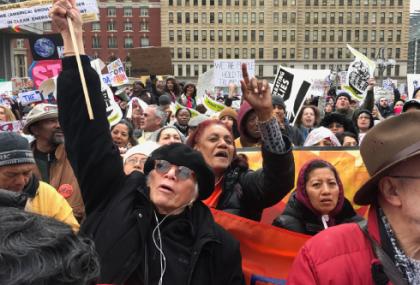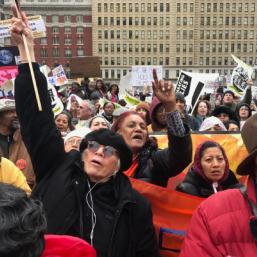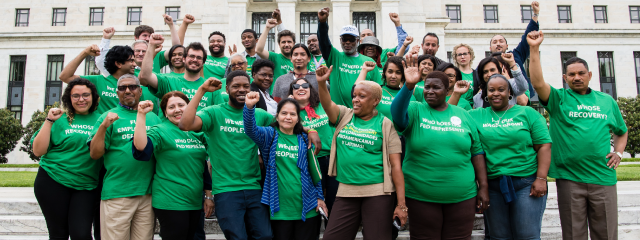Blog


CPD is working closely with Make the Road NY and other partners to combat wage theft.
In 2010, New York workers won a significant victory with the passage of the Wage Theft Prevention Act, which increased penalties and improved notice requirements to stop the scourge of stolen wages from low-wage workers. But the passage of the act was only half the fight.
The NY Department of Labor (NYDOL) currently lacks the resources to make a dent in the wage theft epidemic. In New York City alone, wage theft results in nearly $1 billion being taken out of the pockets of low-wage workers every year. Yet since the 1960’s and 1970’s, the number of NYDOL investigators per capita has plummeted.
As of today, it would take an increase of 200 investigators to return the NYDOL to the staffing levels of decades ago. We are urging Albany to dedicate the resources necessary to truly confront wage theft, which is the most prevalent financial crime against working people in New York State.
“There is an epidemic of wage theft in New York State and an enormous backlog of cases at the Department of Labor,” said Amy Carroll, Deputy Director of the Center for Popular Democracy. “Marginal improvements are insufficient. Governor Cuomo and the Legislature need to fully fund enforcement of minimum wage and overtime. The rule of law and the dignity of New York’s workers depend on their budgetary choices.”
In addition to fighting for an increased number of investigators, the Coalition is pushing back on an effort to repeal the law’s notice provision, which helps employers and workers understand their rights and responsibilities under the law.
The law requires employers to give written notice of wage rates to each new hire and to all employees by February 1 of each year. The notice must include:
- Rate or rates of pay, including overtime rate of pay (if it applies)
- How the employee is paid: by the hour, shift, day, week, commission, etc.
- Regular payday
- Official name of the employer and any other “doing business as” names of business
- Address and phone number of the employer's main office or principal location
- Allowances taken as part of the minimum wage (tips, meal and lodging deductions)
- The notice must be given both in English and in the employee's primary language (if the Labor Department provides a translation of the notice form in that language).
The NYS Coalition to End Wage Theft is an alliance of labor, small business, community, faith, legal services, and policy organizations to tackle the crime of wage theft. Steering committee member groups include (list in formation): Make the Road New York, the Center for Popular Democracy, the National Employment Law Project, Laborers Local 78, Laborers Local 79, Laborers Local 108, Laborers Local 1010, the New York State Labor-Religion Coalition, and the Retail, Wholesale and Department Store Union.
The Center for Popular Democracy will be providing research, organizing, and strategy support to similar campaigns against wage theft across the country in 2014.


For tickets & sponsorship, please visit www.populardemoracy.org/gala


Earlier this month, New York City Mayor Bill de Blasio stood with City Council Speaker Melissa Mark-Viverito to announce legislation that will significantly expand the city’s Earned Sick Time law, providing important protections to New York workers and improving the city’s public health.
The law was originally passed last May with the help of a broad coalition of advocates and community organizations, including CPD, which, along with A Better Balance, has served as legal counsel to the coalition. Mayor de Blasio and Speaker Mark-Viverito announced their plan to immediately expand the protections of the law and to provide for more aggressive enforcement.
As CPD's Deputy Director Amy Carroll and Make the Road New York's CO-Executive Director Javier Valdés write in the Gotham Gazette, "Their decision is a concrete move to confront and alleviate inequality, and bodes well for all New Yorkers, especially low-income workers and their families who live paycheck to paycheck." Read their full Op-Ed here.
And just yesterday, the City Council of Newark, NJ, voted unanimously to become the nation’s seventh municipality to enact a paid sick days law, and the second in New Jersey following Jersey City. Passage in the Garden State’s two largest cities back-to-back signals major momentum there and nationally.
“The rapid spread of paid sick days from city to city across the country demonstrates strong public support for policy that improves the lives of working families,” said CPD’s Co-Executive Director Andrew Friedman upon the Newark law’s passage.
“Progressive coalitions are leading the way, hand-in-hand with elected officials who are committed to a robust economy that creates good jobs and expands our country’s middle class,” Friedman added.
With strategic policy help from CPD, Newark’s robust law will guarantee paid sick days to all workers, regardless of the size of their workplace.


A year ago, the effort to hold Wall Street legally accountable for the mortgage crises seemed to have sputtered out for lack of support at the top of the Justice Department.
Rather than give up, however, determined organizers ramped up pressure in a campaign to reclaim at least some of the wealth that has been robbed from communities of color and others in the mortgage crisis. In May 2013, the Home Defenders League (HDL), a membership organization of struggling homeowners with more than two dozen partners, including the Center for Popular Democracy (CPD), Alliance for a Just Society, Right to the City Alliance, Action for the Common Good and Occupy Homes, staged a dramatic 500 person Justice to Justice Rally and week of action in Washington, DC.
The Campaign for a Fair Settlement, a project of CPD and state partners (Including Alliance of Californians for Community Empowerment, New York Communities for Change, Neighborhoods Organizing for Change, and others), continued to stoke public outrage at the de facto federal “Too Big to Jail” policy--ultimately leading to historic results. At the end of 2013, the Department of Justice responded to public outrage with increased enforcement activity and announced a record $13 billion settlement with JPMorgan Chase.
Although it only accounts for a small fraction of the damage done, the Chase settlement has stronger provisions to get aid to hard-hit homeowners than the previous national mortgage settlement. It also sets an important precedent—the New York Times recently quoted Wall Street sources as predicting at least $50 billion in additional fines on other major banks.
In January, HDL, New York Communities for Change, and an emergency NY state coalition delivered a petition to Governor Cuomo to ensure that the state’s share of JPMorgan settlement funds are used for homeowner relief, instead of being steered toward tax cuts for the wealthy. Click here to sign.
Last month, CPD worked with NYCC and the New Day New York Coalition to coordinate a week of action that called for an end to the special deals for Wall Street and a commitment to building a city that works for all of us. Our groundbreaking report, One New York for All of Us: Leveraging New York’s Financial Power to Combat Inequality,revealed that toxic deals with Wall Street are costing New York City nearly $1 billion annually.


As reported by The Nation last week, CPD’s litigation against the federal government has revealed close collaboration between Wall Street lobbyists and top federal officials.
In October, CPD helped 10 of our partners file a Freedom of Information Act Request seeking all communications between the major Wall Street banks and the Federal Housing Finance Agency (FHFA) about the plans of cities like Richmond, CA, to reduce foreclosures and homeowner debt and stimulate local economies through the use of eminent domain. For the 15.7 million homeowners "underwater," or owing more on their homes than they are worth, eminent domain could help homeowners remain in their homes.
The FHFA failed to respond to our FOIA request and in December we partnered with the ACLU to sue the agency to force a response.
In response, FHFA turned over numerous friendly emails from one of Wall Street's primary lobbying arms - the Securities Industry and Financial Markets Association (SIFMA) - to top agency officials at the FHFA.
The emails show SIFMA urging FHFA to issue regulations prohibiting cities from using eminent domain to reduce the principal on underwater mortgages and help keep families in their homes. In March 2013, the head of SIFMA’s Securitization Group emailed FHFA’s top lawyer and told him that “a federal solution would be the only way to quell this menacing concept.” He urged FHFA to adopt regulations that would prohibit Fannie Mae and Freddie Mac from acquiring or guaranteeing any mortgages in cities that adopt local principal reduction strategies.
And, a few months later, the FHFA responded by publicly threatening to do exactly that.
Advocates are working to push incoming FHFA head Mel Watt, whose appointment was finally approved on Jan. 6, to prioritize the needs of homeowners over the profit margins of the big banks and permit localities to pursue principal reduction strategies free from threats.


Last year, CPD and its partners secured a $500,000 grant from the New York City Council to pilot the New York Immigrant Family Unity Project, the nation’s first-ever public defender program for immigrants who are detained and facing deportation, and a major step forward for New York.
This pilot program, launched in November and staffed by attorneys from The Bronx Defenders and Brooklyn Legal Services, is already taking bold steps to protect immigrant residents from detentions and permanent deportations.
In just the first nine days of intake, the attorneys have undertaken representation in 62 cases. They have obtained release for nine clients, and two more New Yorkers were freed after NYIFUP lawyers won their cases. As the New York Times observed, the NYIFUP pilot is producing real benefits for both New Yorkers who would otherwise lack quality representation and the immigration courts themselves.
As our recent report reveals, our current system of detention and deportation imposes millions in costs on New York State businesses and public programs. Yet for an investment of just 78 cents per personal income tax payer, a statewide system of deportation defense would generate $5.9 million in savings each year.
The opportunity is clear. New York has a chance to be the first state in the nation to send an unequivocal message about how much it values its immigrant residents, how seriously it takes fairness and due process and how committed it is to making the wisest possible investments with public dollars.
CPD is proud to partner with a number of pro-immigrant groups in the legal community toward ensuring that all New Yorkers who are detained and facing deportation are able to benefit from the highest impact legal services available.


We’re both saddened and proud to announce that our Deputy Director and Co-Founder Nisha Agarwal is leaving CPD’s staff to launch a new initiative: the Immigrant Justice Corps (IJC).
The IJC will be the largest expansion of immigration legal assistance in New York City’s history. Inspired by Chief Judge Robert Katzmann of the U.S. Court of Appeals, the IJC will have nearly 100 of the most talented young lawyers and college graduates serving nearly 15,000 individuals every year for legal matters, including naturalization, deportation defense, applications for asylum, and human trafficking.
“It’s a very simple concept, but it’s one that will not only ensure fairness for immigrants but will infuse our legal system with a generation of lawyers committed to serving those in need,” said Judge Katzmann in an article in the New York Times.
We will miss seeing Nisha daily in the CPD office, but she will not be far. We look forward to working closely with the IJC to ensure that immigration status is no longer a barrier to equity and opportunity.
IJC will begin its work in New York City and will offer a powerful model that can be scaled nationwide to fight poverty and improve access to justice for millions of new Americans and aspiring citizens.
Read more about the IJC here: www.justicecorps.org.


CPD’s state partners in Maryland – CASA de Maryland and Communities United – have helped to build a powerful coalition of labor, community, and faith allies, that is driving an aggressive campaign to raise the state’s minimum wage in 2014, which the Governor has thrown full support behind.
While Maryland has the highest percentage of millionaires in the nation, the current minimum wage remains at the base federal level of $7.25 per hour, or only $15,000 per year for a full-time worker. Raise Maryland’s legislation would raise the minimum wage to $10.10/hour by 2016, indexing it to inflation, and raise the wage for tipped workers from 50-70% of the prevailing wage.
On the front lines of grassroots organizing, workers and community members organized by CASA and CU have helped lead actions demanding fair pay and raising the campaign’s profile. Those actions range from dropping “Raise the Wage!” banners over highway overhangs to leading press conferences, as well as direct actions at Walmart and last week’s 400-person campaign launch featuring the Governor. Over the coming months, the fight continues, but Maryland could see higher wagers in 90 days thanks to the critical efforts of CASA, CU, and Raise Maryland.


On Jan. 1, the Center for Popular Democracy and The Leadership Center for the Common Good merged to create the newly strengthened Center for Popular Democracy. The organizations’ sister c4 organizations also merged to create a newly powerful Action for the Common Good.
Planning for 2014 is well underway. CPD staff met with representatives from our 30 core partner organizations in late 2013 for a 3-day retreat to discuss vision, campaign, and strategy for pushing a progressive agenda in the coming year.
Earlier this month, the combined CPD staff – made up of nearly 40 individuals in New York, Illinois, California, Minnesota, and Washington, DC – convened to discuss organizational goals and ambitions for 2014.
It is our shared vision that the new CPD will help change the field of community organizing, creating new strength, scale and reach to advance a pro-worker, pro-immigrant, racial and economic justice agenda.


While Wall Street has bounced back from the financial crisis, recording huge profits, most New Yorkers are still reeling from the destruction caused by these banks. In New York City, the top 1% of households takes home 40% of all household income.
The good news is that New Yorkers are demanding action — and there’s a clear path to real, practical alternatives that can make New York fairer, more livable, and more prosperous.
Today the Center for Popular Democracy and the New Day New York Coalition will release: One New York for All of Us: Leveraging New York’s Financial Power to Combat Inequity. In this groundbreaking report, we argue that with over $350 billion traveling through the financial system, the City can and should renegotiate its deals with Wall Street and save up to $725 million each year. New York City should be serving the public interest, not the big banks.
The New Day New York Coalition includes United NY; Strong Economy for All Coalition; ALIGN NY; New York Communities for Change; Make the Road NY; Alliance for Quality Education; Coalition for Educational Justice; Walmart Free New York; Coalition for the Homeless; Food and Water Watch; NY Citizen Action; Met Council on Housing; Community Voices Heard; United Federation of Teachers; Professional Staff Congress; Retail, Wholesale and Department Store Union (UFCW); Communication Workers of America Transport Workers Union Local 100; New York State Nurses Association; Service Employees International Union 1199 – United Healthcare Workers East; Service Employees International Union 32BJ; Alternative Banking; Not An Alternative; Beautiful Trouble; 99 Pickets; MoveOn NY; and others.
Key findings:
- The city and associated entities pay $160 million a year for bad deals with banks.
- The city, its pension funds, and the Metropolitan Transportation Authority pay $563 million in base Wall Street fees each year.
- New York City and State give banks subsidies worth about $300 million a year, without ensuring that New York City communities will benefit.
- Because their wages are so low, 39% of bank tellers and their family members rely on at least one public assistance program, at a total government cost of $112 million.
- During the past 5 years, foreclosures have cost New York City $1.9 billion in expenses and lost revenue.
Key recommendations:
- Renegotiate toxic financial deals to save up to $725 million each year. -Use the city’s economic and financial leverage to lower fees and interest rates for new and existing financial services. -Investigate unethical behavior by Wall Street and prosecute fraud to the fullest extent of the law to recover losses. -If Wall Street won’t negotiate in good faith, bring these functions into the city by creating an in-house financial management team and/or a publicly owned city bank.
- Save money and create jobs by holding banks to firm commitments to the community in return for $300 million each year in city subsidies for banks.
- Write down underwater mortgages to keep 86,000 families in their homes and stimulate the local economy by as much as $1 billion.
The report is part of a week of action that is calling for an end to the special deals for Wall Street and a commitment to building a city that works for all of us. Take action by signing a petition that tells NYC to end toxic Wall Street deals, forwarding this blog post to a friend, or standing with us during the week of action. It's time to demand a city that works for #AllofUs.














